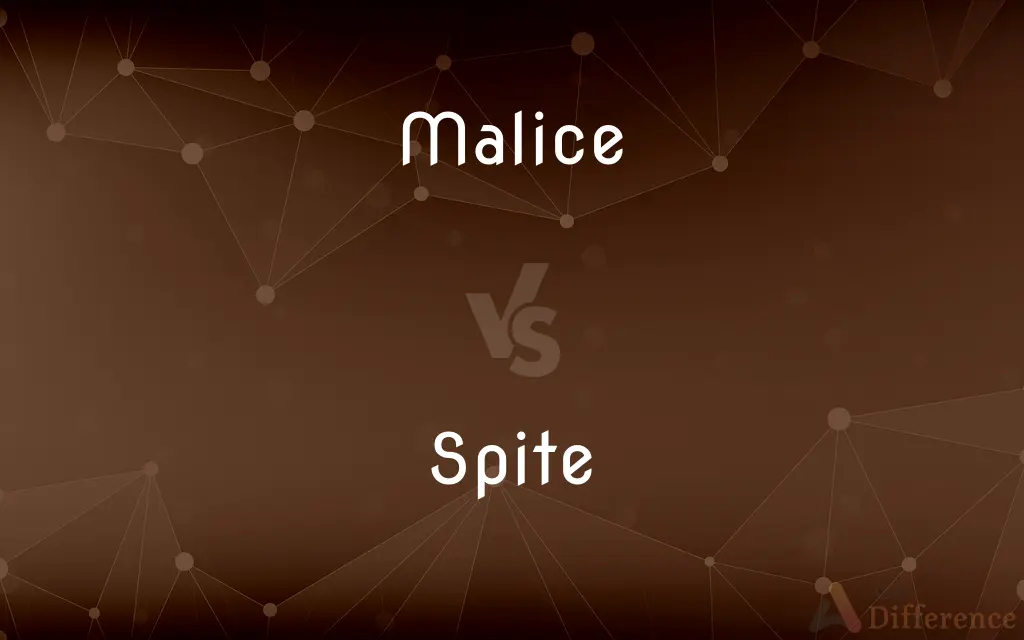Malice vs. Spite — What's the Difference?
By Tayyaba Rehman — Updated on September 14, 2023
Malice refers to the intention to harm or hurt, while Spite is acting out of pettiness or a desire to hurt someone in reaction to perceived wrongs.

Difference Between Malice and Spite
Table of Contents
ADVERTISEMENT
Key Differences
Malice, at its core, is the deep-seated intention or desire to cause harm or suffering to another, be it physically, emotionally, or mentally. Spite, on the other hand, often arises from a reaction or a personal grudge. It's a retaliatory sentiment or action taken because of envy, jealousy, or perceived wrongs.
Malice can exist without action. A person might harbor malicious feelings toward someone without ever acting upon those feelings. Spite requires action—it’s the manifestation of those feelings in some form of harmful behavior or words, often impulsively.
Both Malice and Spite indicate negative sentiments, but their depth and origin might differ. Malice suggests deeper and often more concealed feelings of hostility, while Spite is generally more overt and immediate. One can act out of Spite without necessarily having malicious intentions at the core.
In legal contexts, Malice can be a significant component when determining intent behind certain crimes, emphasizing premeditation. Spite doesn't typically hold the same weight legally but can be evidence of a person's motivations or state of mind during a dispute.
Comparison Chart
Definition
Desire to harm or hurt another.
A desire to hurt in reaction to a slight.
ADVERTISEMENT
Origin
Deep-seated negative feelings.
Reaction to perceived wrongs.
Action required
Can exist without outward action.
Requires a retaliatory action.
Depth
Deeper and concealed hostility.
More overt and immediate.
Legal weight
Often significant in intent determination.
Less emphasized in legal contexts.
Compare with Definitions
Malice
Desire to cause pain, injury, or distress.
The criminal's Malice was evident in his deeds.
Spite
Vindictive action against a perceived slight.
He quit out of Spite.
Malice
Intention to harm without justification.
His actions were driven by pure Malice.
Spite
Act of petty revenge.
He didn't attend the event, citing his absence as an act of Spite.
Malice
Wishing evil upon others.
Her words were filled with Malice.
Spite
Deliberate provocation or annoyance.
The noise was made out of pure Spite.
Malice
Deep-seated ill-will or resentment.
There was a hint of Malice in his eyes.
Spite
Malicious ill will prompting an urge to hurt or humiliate another person.
Malice
Act of malevolence or wrongdoing.
The letter was written with clear Malice.
Spite
To treat with spite; show spite toward
"Maybe she became engaged to him in order to spite another man" (Nathaniel West).
Malice
A desire to harm others or to see others suffer; extreme ill will or spite.
Spite
Ill will or hatred toward another, accompanied with the desire to unjustifiably irritate, annoy, or thwart; a want to disturb or put out another; mild malice
He was so filled with spite for his ex-wife, his brother was afraid of what he might do.
They did it just for spite.
Malice
The intent to commit an unlawful act without justification or excuse.
Spite
(obsolete) Vexation; chagrin; mortification.
Malice
An improper motive for an action, such as desire to cause injury to another.
Spite
(transitive) To treat maliciously; to try to hurt or thwart.
She soon married again, to spite her ex-husband.
Malice
Intention to harm or deprive in an illegal or immoral way. Desire to take pleasure in another's misfortune.
Spite
To be angry at; to hate.
Malice
An intention to do injury to another party, which in many jurisdictions is a distinguishing factor between the crimes of murder and manslaughter.
Spite
(transitive) To fill with spite; to offend; to vex.
Malice
To intend to cause harm; to bear malice.
Spite
Notwithstanding; despite.
Malice
Enmity of heart; malevolence; ill will; a spirit delighting in harm or misfortune to another; a disposition to injure another; a malignant design of evil.
Envy, hatred, and malice are three distinct passions of the mind.
Spite
Ill-will or hatred toward another, accompanied with the disposition to irritate, annoy, or thwart; petty malice; grudge; rancor; despite.
This is the deadly spite that angers.
Malice
Any wicked or mischievous intention of the mind; a depraved inclination to mischief; an intention to vex, annoy, or injure another person, or to do a wrongful act without just cause or cause or excuse; a wanton disregard of the rights or safety of others; willfulness.
Proud tyrants who maliciously destroyAnd ride o'er ruins with malignant joy.
In some connections, malignity seems rather more pertinently applied to a radical depravity of nature, and malignancy to indications of this depravity, in temper and conduct in particular instances.
Spite
Vexation; chargrin; mortification.
Malice
To regard with extreme ill will.
Spite
To be angry at; to hate.
The Danes, then . . . pagans, spited places of religion.
Malice
Feeling a need to see others suffer
Spite
To treat maliciously; to try to injure or thwart.
Malice
The quality of threatening evil
Spite
To fill with spite; to offend; to vex.
Darius, spited at the Magi, endeavored to abolish not only their learning, but their language.
Spite
Feeling a need to see others suffer
Spite
Malevolence by virtue of being malicious or spiteful or nasty
Spite
Hurt the feelings of;
She hurt me when she did not include me among her guests
This remark really bruised me ego
Spite
Petty ill-will or hatred with the desire to annoy.
She made the comment purely out of Spite.
Spite
A grudging desire to harm someone in retaliation.
In Spite, she spread rumors about her rival.
Common Curiosities
What does Spite mean?
Spite is acting out of pettiness or a desire to hurt someone in response to a perceived wrong.
Is Spite always retaliatory?
Typically, Spite is a reaction to a perceived wrong or slight.
What is Malice?
Malice refers to a desire or intention to harm or hurt someone.
Is Malice premeditated?
Malice often suggests premeditation or a longstanding desire to harm.
How is Malice viewed legally?
In legal contexts, Malice can determine intent behind certain crimes, indicating premeditation.
Can one feel Malice without expressing it?
Absolutely. One can harbor malicious feelings without acting on them.
Is Spite a form of Malice?
Spite can arise from malicious feelings, but they are distinct in terms of origin and depth.
Can Malice exist without action?
Yes, Malice can exist as an intention without any outward manifestation.
Which is deeper, Malice or Spite?
Malice suggests a deeper and often concealed hostility, while Spite is generally more immediate.
How can one differentiate between a malicious act and a spiteful act?
A malicious act stems from a deeper desire to harm, while a spiteful act is often more reactionary to a specific slight.
Can someone act out of Spite without Malice?
Yes, someone might act out of Spite as an impulsive reaction without deeper malicious intent.
Are Malice and Spite emotions or actions?
Malice is primarily an emotion or intent, while Spite is both an emotion and an action.
Does Spite have legal implications?
While not as weighty as Malice, Spite can indicate a person's motivations or state of mind during a dispute.
What might cause a person to act out of Spite?
Feelings of envy, jealousy, or perceived wrongs often lead to spiteful actions.
Can actions be both malicious and spiteful?
Yes, actions can be driven by both a deep-seated desire to harm and a reaction to a specific slight.
Share Your Discovery

Previous Comparison
Necromancer vs. Witch
Next Comparison
Bewitched vs. EnchantedAuthor Spotlight
Written by
Tayyaba RehmanTayyaba Rehman is a distinguished writer, currently serving as a primary contributor to askdifference.com. As a researcher in semantics and etymology, Tayyaba's passion for the complexity of languages and their distinctions has found a perfect home on the platform. Tayyaba delves into the intricacies of language, distinguishing between commonly confused words and phrases, thereby providing clarity for readers worldwide.














































